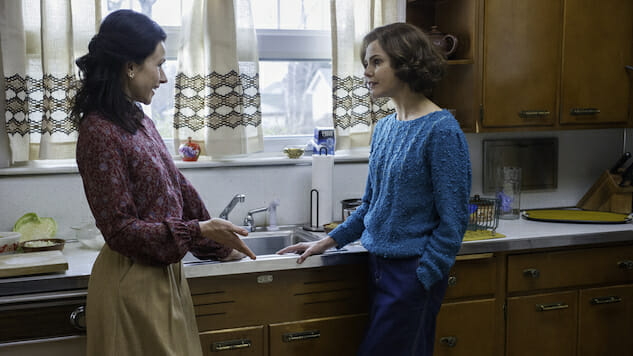The Americans: In Medias Res
(Episode 5.08)
Jeffrey Neira/FX
There’s a moment in “Immersion”—you already know the one I mean—at which the camera pans to the patch in the wall and Paige (Holly Taylor) drifts out of focus. Even before Elizabeth (Keri Russell) speaks, the sight of the rough rectangle where her rapist’s head punctured the plaster steels us against the onrush of the past, just as Elizabeth steels herself: She closes her eyes, face framed in tight close-up, and tells of that long-ago trauma as one that shaped, then re-shaped, her life. “The more I fought, the better I felt,” she says, reassuring her daughter that the terror she’s feeling will eventually dissipate. “And I’m OK. I’m not afraid anymore. And you’re not going to be, either.”
Here, in the Jennings’ garage, as Paige, impatient for progress, continues her training, The Americans displays its adroit sense, as Joan Didion once wrote, that “style is character.” With the slightest change in the composition of the image, we become privy to Elizabeth’s train of thought: At first, the mention of fear sends her eye, and her mind, to its lingering traces; then, we watch her gather her strength, channeling calm; finally, we return to Paige, her expression of surprise and concern swiftly met by her mother’s comfort. In short, the scene combines the actors’ emotional naturalism with the series’ subtle formal cues to suggest the hour’s hinge, the central event in an episode that begins and ends in medias res. At a glance, “Immersion” seems as soft as a whisper, but as with much of The Americans’ fifth season, its echo carries far.
-

-

-

-

-

-

-

-

-

-

-

-

-

-

-

-

-

-

-

-

-

-

-

-

-

-

-

-

-

-

-

-

-

-

-

-

-

-

-

-








































